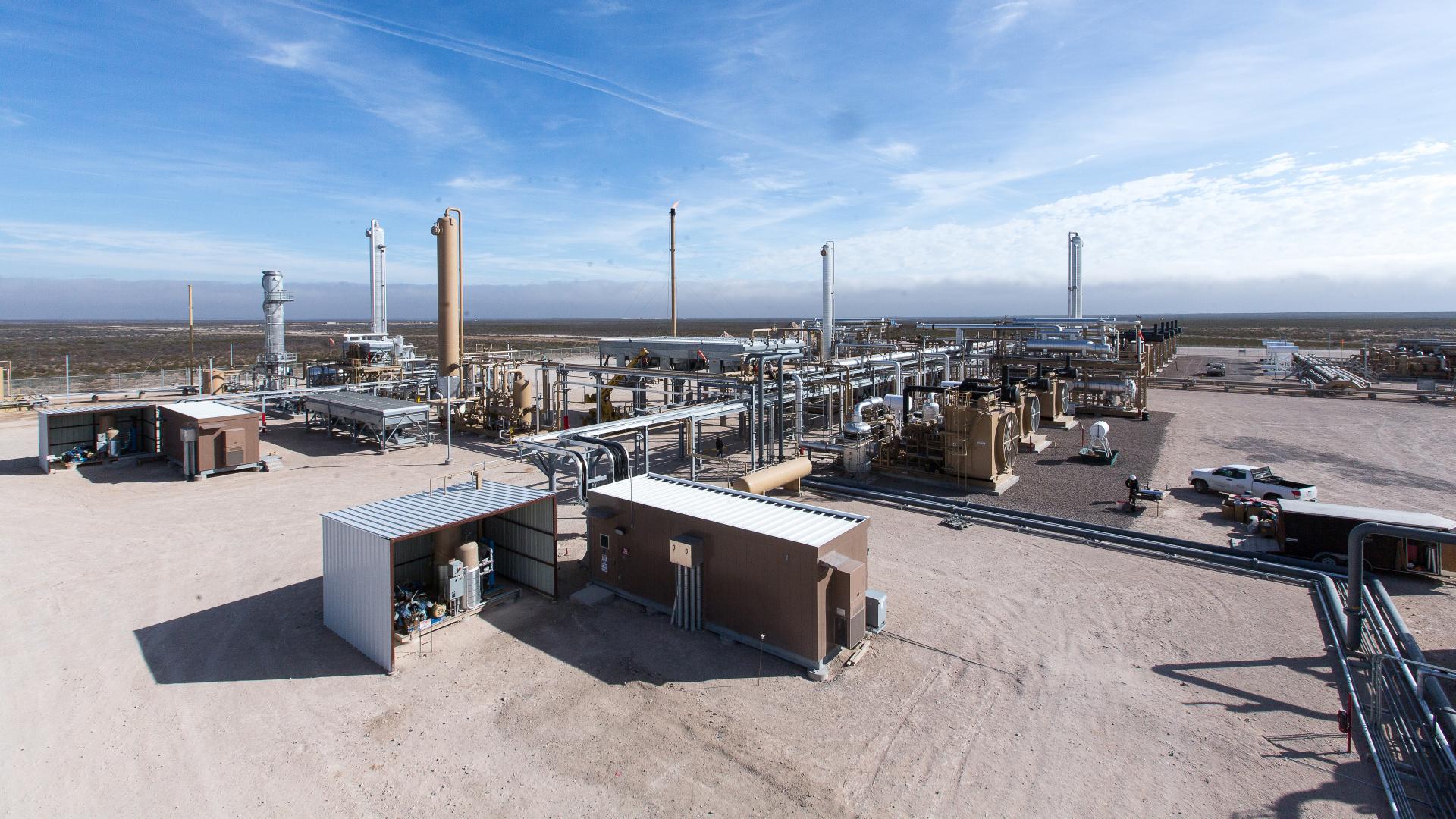Keep Hydrocarbons In Check With Dew Point Control
Maximize the BTUs in Your Pipeline or Gas Streams
Natural gas processing consists of separating various hydrocarbons and fluids from the pure natural gas to produce what is known as pipeline quality dry natural gas. If natural gas is not processed, heavy hydrocarbons could condense during transportation, causing a variety of operational and safety problems for pipelines, as well as for end-use applications.
Dew point is defined as the temperature at which hydrocarbons begin to condense in a gas mixture at a given pressure — usually 1 atm (atmospheric pressure). Pipeline specification determines the dew point required. Enerflex provides a selection of dew point control methods — each used to their specific capabilities to remove heavier hydrocarbons, such as ethane (C2), propane (C3), butane (C4), and pentane (C5) from natural gas.
Hydrocarbon Extraction to Fit All Gas Conditions
Enerflex will design a system that gives customers the balance of technical and economic performance that they are looking for, tailored to the precise make-up and conditions of the raw gas stream.
Specialized Hydrocarbon Extraction Industry-Wide
- Joule Thomson Units
Our Joule-Thomson (JT) plants prepare gas for pipeline transmission by removing NGLs for additional revenue. A JT plant is a self-refrigeration system with no moving parts and no external power needs, which is a simple and economical alternative to standard refrigeration. Enerflex provides solutions that:
- Control BTU value when high pressure gas is available
- Provide a -6.5°C to 10°C (20°F to 50°F) temperature reduction based on pressure drop
- Require compression prior to sales
- Can operate as warm as 15.5°C (60°F)
- Can achieve as low as -26°C (-15°F) dew point capability
- Mechanical Refrigeration Units
Enerflex fabricates both standard and custom mechanical refrigeration units (MRUs) to chill the incoming natural gas stream as low as -40°C (-40°F), using an external refrigeration system, typically propane. The NGLs from the cold separator are stabilized in a de-ethanizer column and sent to pressurized storage or further fractionation.
Enerflex’s easy-to-install, modular systems are engineered and designed to integrate seamlessly with our stabilization and / or fractionation technologies.
- Fuel Gas Conditioning Skids
As part of the complete package — and most commonly on larger turnkey facility projects — Enerflex can provide modular fuel gas conditioning systems to reduce pressure, remove water, and lower BTUs for leaner compressor fuel and instrumentation gas.
Enerflex in Action
- Eagle Ford Shale, Texas, USA
Twelve Module Multi-Dew Point Plants
Enerflex engineered and fabricated 12 modules, each containing a gas processing system, refrigeration system, depropanizer, stabilizer, ethylene glycol regeneration package, hot oil system, VRU compression, and engine-driven refrigeration compression. Enerflex’s expertise in modularized gas plants minimized project time and price risk.
Enerflex engineered, designed, and manufactured refrigerated propane dew point plants ranging in size from 45 MMSCFD to 80 MMSCFD, each equipped with depropanizer and debutanizer columns.Outcome
A collaborative design between Enerflex and the customer maximized the potential of the plant, while minimizing expenditure and time-to-market for the liquids-rich gas. The Texas plants are now a blueprint that can be easily applied to similar shale plays around the country.
- Bayoot Oilfield, East Sarr, Republic of Yemen
Fuel Gas Treating Unit Replaces Diesel
Enerflex installed a fuel gas treating unit (FGTU) to replace diesel with on-site fuel gas suitable for bi-fuel systems and engines used in the Sharyoof and Bayoot fields. The design can treat 3 MMSCFD of gas to increase methane content in fuel gas from 60% to 84%. The FGTU produces 128 BBL/D to 159 BBL/D NGLs for export.
The Enerflex modularized FGTU includes an electric-drive, two-stage reciprocating compressor, forced-draft aerial coolers, a HIMA XMR control panel, pressure vessels, internals, skid assemblies, steel structure, on-module piping, fittings, valves, electro-mechanical equipment, and instrumentation.
Outcome
The Enerflex solution increased methane content by 25% and injected 159 BBL/D of NGL into the sales pipeline. The onsite consumption of treated gas reduced waste flaring at Bayoot.
